If you’re coffee aficionados like we are, read on. We’ve highlighted some of our absolute favorites in Kona coffee and all other Hawaii coffees statewide.
Hawaii coffee is a $50 million a year industry. It is comprised of about 900 coffee farms on all of the islands. Hawaii coffee to this day remains a rarity, and represents less than one-half of one percent of global coffee production.
Did you know that while Hawaii is renowned for its 100% Kona coffee, in reality there is much great Hawaii coffee that has nothing to do with Kona?
Hawaii’s cost structure is such that coffee farmers here can obviously never compete with those in Africa or Central America on price. Hawaii coffees are always considered to be premium, value added product.
So bottom line, is if you’re satisfied with cheaper coffees from elsewhere, you may want to stop reading now. If, on the other hand, you want to have a totally unique and perhaps even world class culinary experience on your Hawaii vacation, read on. For us, when we travel between the islands, trying coffee is a definite part of the fun.
One last note, before moving on to what each island has to offer. When we are talking about coffee, we aren’t talking here about the kind of coffee with milk and sugar. We’re talking about what is frequently termed “third wave coffee.” What’s that?
- First wave coffee: That is the coffee that we here grew up on. Canned, roasted, ground coffee, followed by instant.
- Second wave coffee: Basically coffee that is defined by Starbucks and similar companies.
- Third wave coffee: That is about achieving new levels of excellence in coffee, direct trade, sustainable farming, using lighter roasts, and prepared with novel brewing and serving methods.
Oahu Coffee Guide
Coffee is grown, roasted and served in abundance in the hub of Hawaii, Oahu. Growers include Waialua Coffee and Green World among others. You can taste divine coffee or buy freshly roasted beans on Oahu, with a plethora of options for Hawaii grown. You need go no further than ARS on Monserrat, Morning Glass Coffee in Manoa Valley, Glazers on King Street, Bru Bar on Merchant Street, Honolulu Coffee Company at Waikiki and Ala Moana shopping center, and 9Bar on Auahi Street. Our hands down favorites, however, are The Curb Kaimuki for fabulous coffee including the best nitro we have ever tasted, and Kona Coffee Purveyors in Waikiki, for both great coffee and incredible pastries.
Maui Coffee Guide
Maui is a happening place for Hawaii coffee, from growing and roasting to drinking. Big roasters include MauiGrown, which is the largest individual coffee grower in the US and the only major purveyor of 100% maui grown coffee.
Nearly 600 acres of coffee production, both large and small, make up the island’s coffee farms. Many coffee varieties are grown with the aid of micro climates along Haleakala’s slopes and in the West Maui mountains.
Maui coffee is supported by the Maui Coffee Association that helps bring the industry together.
Great Maui coffee is to be found at Akamai Coffee in Kihei, Honolulu Coffee at the Shops at Wailea, Mill House Roasting Co. and Maui Coffee Attic in Wailuku, MauiGrown coffee in Lahaina, and Maui Oma Coffee roasting in Kahului.
Kauai Coffee Guide
Kauai is home to the largest coffee farm in the United States. Kauai Coffee Company is owned by the same company as MJB and Hills Bros., and has 4 million coffee trees on 3,000 acres on the island’s southwest corner in Eleele. They produce a wide range of commercially grown and harvested coffee and are one of the largest user of chemicals on the entire island of Kauai. Enjoyable visitor tasting center on Kauai.
For tasting, head straight to Aloha Roastery, owned by twin brother friends of Beat of Hawaii. They have two locations, in Koloa and Lihue.
Molokai Coffee Guide
Our friends at Coffees of Hawaii are the only ones that grow and roasts 100% Molokai coffee. They are based on 500 acres in up country Kualapuu. Lovely store and coffee shop, with tours too.
Big Island and Kona Coffee Guide
You might just say that we saved the best for last. Most of Hawaii’s award winning coffees emanate from the Big Island. But you may be surprised to learn that many of those emanate not from Kona, but from Ka`u. But more on that below.
Kona coffee, of course, is the iconic coffee grown on the slopes of the Big Island’s volcanoes. It’s been growing there since the mid-1800’s.
Coffee tours are a worthwhile activity while vacationing on the Big Island. Years ago we toured Greenwell Farms, which has the distinction of having been owned by Henry Greenwell, who was first honored for his Kona coffee in the 1800’s in Vienna.
Our Big Island coffee favorites include grower/roasters Rusty’s Hawaiian in Ka’u district, and Hula Daddy (straight up from the Kona airport) in Holualoa. Also these coffee shops: Daylight Mind and Kona Coffee and Tea in Kona.
Ka`u coffee has a reputation every bit as fine as Kona coffee, and perhaps even more so. Ka’u coffee has in recent years attained top place in coffee competitions. Puna and Hamakua regions are also well known for their coffees.
When buying Hawaii coffees, keep these facts in mind:
1. Cost. Hand processed coffee from Hawaii, by its nature, is going to be very costly. Expect to pay from $30 upwards to $100 per pound for the most interesting coffees.
2. What is blend coffee? In the 1990’s a law permitted blended coffee with 10% Kona beans to be called as “10% Kona coffee.” Avoid that like the plague. It has absolutely nothing to do with Kona coffee, except for the name.
3. Enjoy Hawaii coffees while in Hawaii. You just have 10 days from roasting to consumer roasted coffee at its peak. We at Beat of Hawaii are home coffee roasters and have been for years. We can tell you that coffee should be consumed soon after roasting. Packaging, including nitrogen flushing does nothing to change that rule. So it is best to just enjoy it when you are in the islands, and take home memories, rather than stale coffee.
4. For the real deal, buy at a roaster rather than a grocery store. Be sure you know the date of roasting.
5. If it is inexpensive, it isn’t real. That is for sure. If you’re buying machine produced commercial coffee, such as from Kauai Coffee, you will pay less, but the experience is simply not the same.
Please ask any questions about Hawaii’s 3rd wave coffee or share your Hawaii coffee tips below!
Beat of Hawaii photo at Kona Coffee Purveyors in Waikiki.
Get Breaking Hawaii Travel News
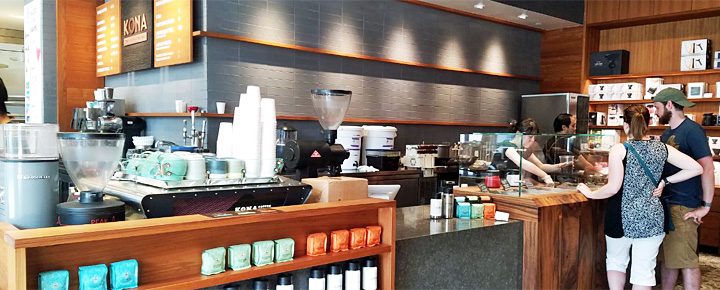
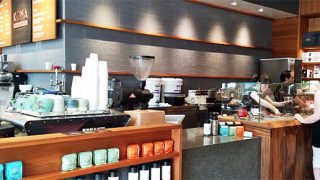
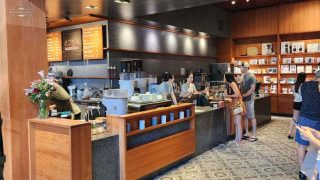
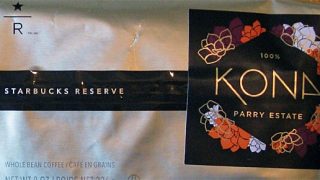
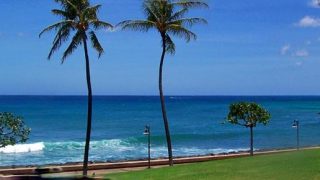
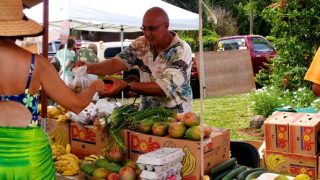
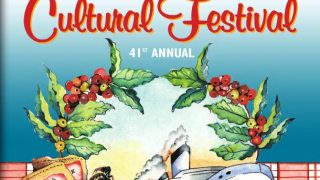
Some of the best Kona coffee I ever tasted is from Keopu Mill coffee farm located in the small strip of the historic Kona coffee growing district in Kona. The owner hand picks every red bean and never includes any green beans in his coffee production. It is sooo fresh, if visiting the island you can take some home with you knowing that it has just been roasted that very day. He will ship to you via UPS (3 days only to East coast of mainland) Talk about fresh; give it a try you wont be sorry. [email protected]
Hua Hua Farm grows fantastic Kona coffee and does mail order. I would highly recommend their coffee. http://huahuafarm.com/
They are also involved in the class action lawsuit on the part of Kona coffee growers with regard to the false labeling of Kona coffee
SHIM Kula coffee is one of the best i’ve had!
My parents lived in the house next to the kauaicoffee company office in New Mill. I grew up on Kauai Coffee and now have subscription service for decaf coffee as stores in Los Angeles don’t carry it.. As their motto goes,” Wake up to Kauai Coffee”, I do that everyday!
Kona coffee is grown in a limited strip of land on the Big Island. What qualifies as Kona is defined by the area in which it is grown.
Could you explain the chemicals used by Kauia Coffee Company? Is this a different company then the link below? I love Kauia coffee but I also try to do organic/non gmo so I was concerned when I saw they use high levels of pesticides https://www.prnewswire.com/news-releases/kauai-coffee-company-continues-growing-responsibly-movement-by-becoming-non-gmo-project-verified-300753843.html